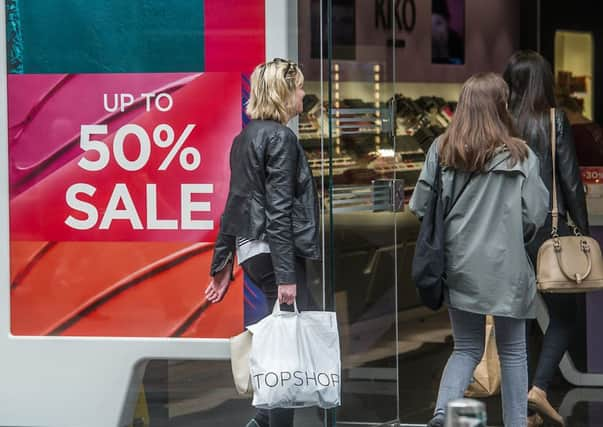Rising inflation and muted wages hit the high street
This article contains affiliate links. We may earn a small commission on items purchased through this article, but that does not affect our editorial judgement.


The bleaker retail sales picture is set to vindicate City economists who have forecast that despite the resilience of the economy following Brexit and Donald Trump’s shock presidential election victory it would be squeezed by negative factors this year.
Data is expected to show that amid the squeeze being felt by cash-strapped consumers retail sales volumes in March will have fallen by between 0.2 and 0.5 per cent.
Advertisement
Hide AdAdvertisement
Hide Ad• READ MORE: Cost of living fears mount as inflation hits 2.3%
The lower figure would give a slide over the quarter of 1.1 per cent – the first quarterly high street fall in more than three years.
“The overall impression coming through is that consumers are now moderating their spending as markedly higher inflation eats into their purchasing power in tandem with subdued earnings growth,” Howard Archer, of IHS Markit, said.
“Even allowing for the fact that consumer spending has held up better on services so far, this would still point to markedly weaker consumer spending weighing down on GDP growth in the first quarter.”
IHS Markit believes UK economic growth may have slowed to 0.4 per cent in the first three months of this year, down from 0.7 per cent in the fourth quarter of 2016, primarily due to the weaker consumer spending.
Figures from the British Retail Consortium last week highlighted falling demand for clothing, toys and white goods as being the prime drivers of a 1 per cent fall in sales volumes last month.
The mid-April Easter this year is also seen as having impacted sales figures because the religious holiday, which often spurs retail sales, fell in March a year ago so the comparatives were tougher.
Advertisement
Hide AdAdvertisement
Hide AdIt is also thought possible that shoppers pulled forward their purchases to the final quarter of 2016 as they sought to beat expected rising prices in the New Year.
Meanwhile, the official consumer prices index – the barometer of inflation – shows that prices have risen 2.3 per cent over the past 12 months.
Economists also say the pressure will ratchet up on households as the slump in sterling since last summer’s Brexit vote is likely to push inflation to about 3 per cent by late this year.
One said: “The fundamentals for consumers look odds-on to weaken markedly over the coming months as rising inflation eats further into purchasing power with the squeeze reinforced by muted earnings growth.
“It is also very possible that consumers will face a weakening labour market.” The City believes Brexit concerns as the negotiations go on with the EU could also depress underlying consumer sentiment.
The retail sector accounts for about 10 per cent of the UK economy, roughly the same as the financial services industry.